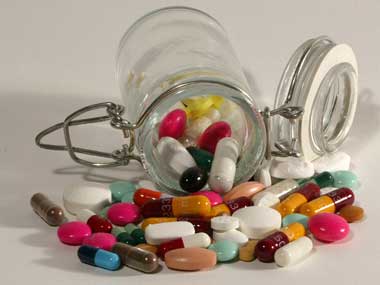Aspirin’s history goes back some 3,500 years when the Egyptians and the Sumerians started using willow bark, a natural source of salicylates, the main salt in aspirin, to alleviate pain and fever. In 1897, Felix Hoffmann, a chemist associated with the pharmaceutical company Bayer, synthesised aspirin. [caption id=“attachment_4492039” align=“alignleft” width=“380”] Representational image. Reuters.[/caption] In 1971, Sir John Vane figured out that aspirin could also help patients with cardiovascular and cerebrovascular diseases. Today, aspirin is one of the most widely used drugs globally. Indeed, many people take it as a prophylactic, to prevent heart attack and brain stroke.
Earlier this year, The Lancet science journal published research that showed the polypill, a combination of aspirin, statin and two or three blood-pressure medicines, can reduce the chances of heart disease. The polypill comes in the category of preventive medicine, with a focus on keeping people healthy rather than treating the already sick. Yet, aspirin is also one of those drugs that every doctor (and dentist) will ask you about before doing an invasive procedure, no matter how small. But why do they specifically ask if you have taken an aspirin? Painkiller and more Aspirin contains the salt acetylsalicylate that belongs to NSAIDS drug category of painkillers. Aspirin helps to reduce fever, pain and inflammation by counteracting mediators in the blood that could potentially cause you pain and discomfort. Today, even young people around the world take aspirin as a precaution against heart attacks, but one should not take aspirin without a doctor’s go-ahead. The main chemical in Aspirin, salicylate, is also available in cream form for topical application on acne, to reduce pain and inflammation caused by a large bump. Many people also use aspirin powder (made by crushing a tablet) as a home remedy for pimples, they apply it directly over the reddish bump. Because of its anti-inflammatory and analgesic properties, aspirin is also used in cases of arthritis and joint pain. Guardian of the heart Around 38 years ago, researchers at the Harvard Medical School and Brigham and Women’s Hospital (a Harvard teaching hospital) started the Physicians’ Health Study to look into any heart-protective effects of aspirin. The study, which ended in 1995, showed that small doses of aspirin (100 milligrams or less), when used as a blood thinner to prevent blood clots, could significantly reduce the chances of a heart attack or brain stroke. As a result, people living with high cholesterol or those who have recently had bypass surgery or a coronary stent put in, are often prescribed daily tablets of aspirin (or Ecospirin, in some cases). “Low-dose aspirin reduces risk of heart attacks, but at the same time, is associated with increased risk of bleeding. Several recent studies have shown that in patients who do not have significant blockages in their arteries, the benefit with aspirin is much smaller than the risk. Therefore, such individuals should not take aspirin,” said Manish Bansal, senior consultant of clinical and preventive cardiology at Medanta, The Medicity hospital. “On the other hand, those who already have significant blockages, have suffered a heart attack or stroke or those who have undergone bypass surgery or angioplasty, in them the benefit with aspirin is much greater than any risk. Hence, all such patients must routinely take low-dose aspirin,” he said. Double-edged sword One should never take aspirin without a doctor’s advice. Because aspirin is a blood thinner. By thinning out the blood, it sets a positive environment for bleeding. This is why aspirin is not used for people who have a bleeding or clotting disorder or stomach ulcers (the Delhi government banned over-the-counter sale of aspirin in 2017). Patients who take daily doses of aspirin are also asked to discontinue the medicine a few days before any surgery or invasive operation to avoid excessive bleeding. According to the World Health Organisation, people who have been diagnosed with Dengue also should not take aspirin, instead, they can take paracetamol to bring down the fever. Aspirin is also said to have a “rebound effect”. Research shows that once you stop the drug, the chances of heart attack and stroke increase. On the one hand, polypills and aspirin, when prescribed by a doctor, can reduce the risk of blood clots, heart attacks and stroke, and on the other, it can increase bleeding. It is no wonder doctors call it a double-edged sword! Health articles in Firstpost are written by myUpchar.com, India’s first and biggest resource for verified medical information. At myUpchar, researchers and journalists work with doctors to bring you information on all things health. For more information, please read Aspirin: Benefits and Side-effects. MyUpchar does not recommend the use of this medication without a doctor’s prescription.


)

)
)
)
)
)
)
)
)



